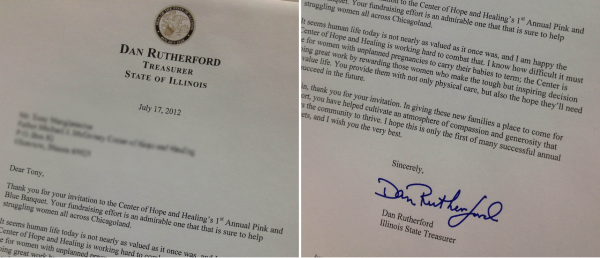Posers in power
In my first job, I was a ghostwriter for a local politician. I wrote letters on behalf of the Illinois State Treasurer to business leaders and politicians across the state. These letters were signed by an autopen—a robotic arm that legally notarized documents when the treasurer was too busy to do it himself.

A letter that was written by me and signed by an autopen. (Keep that on the DL).
After several months of this legal charade, it dawned on me that the “treasurer’s” (i.e. my) letters probably weren’t being read by the leaders they were addressed to. If the treasurer didn’t have time to write them, why would the recipients have time to read them? They were probably opened reluctantly by some bored intern who (maybe) noted the letter’s existence in an obscure spreadsheet somewhere.
The whole thing began to seem like a farce—an army of young interns, writing messages to each other behind the masks of their superiors.
The mother-Zucker
Watching the Zuckerberg hearing last week, it was obvious that many of the senators did not actually understand the questions they were asking. When asked to rephrase, they were often incapable of posing the question in their own words. These questions were probably prepared by tech-savvy millennial staffers. The lawmakers’ job was merely to read them aloud—comprehension be damned.
The chorus of the hearing was Zuckerberg’s now-infamous line: “I’ll have my team follow up with you.” He was certainly well-versed on some topics, but he deferred to his staffers surprisingly often.
To review: the senators were reading questions prepared by their staffers. And Zuckerberg was offering responses prepared by his staffers. As this theater unfolded on the congressional stage, I couldn’t help but think back to my job at the treasurer’s office. It seems that politics is a play in which knowledgeable staffers communicate to each other through figureheads who pretend to be more competent than they really are. This is probably unsurprising and uninteresting to anyone who traffics in circles of power. But I find it pretty funny and absurd.
Human interfaces
A few weeks ago, I wrote about how an interface is a map of a complex territory. A light switch, for instance, allows you to manipulate your home’s electrical wiring system without understanding how it works. Normally, the term “human interface” refers to the design of computer interfaces that are usable by humans.
But there’s a very real sense in which our politicians and figureheads are literal human interfaces. In other words, they’re interfaces to the knowledge and experience contained in other humans (usually, their staffers). They’re the last step in an extremely long filtering and curation process that travels through many levels of organizational hierarchy. In programming parlance, when one figurehead (senator) talks to another (CEO), it’s like one highly abstracted function calling another. All of the implementation details are black boxes—inaccessible by both players. But the efficiency gain that results from abstraction is massive.
Routers vs. puppets
I’m curious what the world would look like if we didn’t have such reverence for figureheads and talking heads. What if the congressional staffers interrogated the Facebook staffers without having to go through a “powerful” representative? Maybe the representative’s role should be to know who’s most knowledgeable on a given topic and nominate the right person for the job at hand. More like a router than a puppet. Imagine how radical it would be if a senator allowed the person who actually wrote the questions to sit in the chair.
This shift seems unlikely because we’re so attached to the hero archetype who knows it all and can save us from our sins. The truth is that this way of understanding power is a relic from a bygone era when it was more possible for one person to understand the workings of an entire system.
At the end of my internship at the treasurer’s office, I wrote the thank you letter from the “treasurer” to all of the other interns. Signed, sealed, delivered. I didn’t tell any of the other interns because I felt so bad about this autopen-powered white lie. I thought to myself that maybe, just maybe, we’d end this silly charade one day.